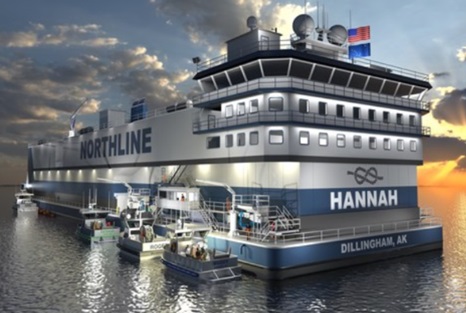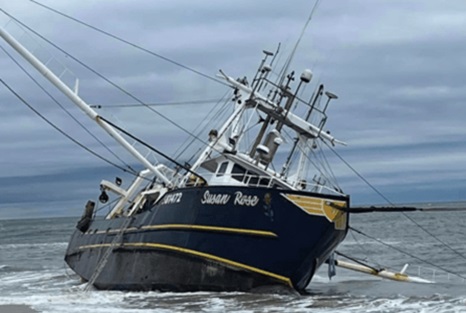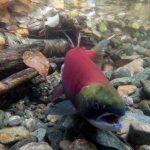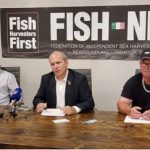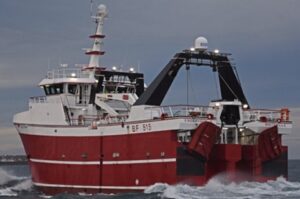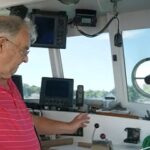Category Archives: Featured
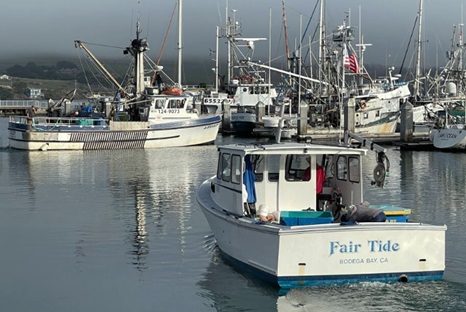
Dungeness crab season gets underway amid hope for relief in commercial fishing fleet
On Sunday, veteran fisherman Chris Lawson learned he had lost his eldest granddaughter in a terrible crash on the Bay Bridge. The next day, he was out on his commercial fishing vessel, Seaward, setting traps on the ocean floor in preparation for the delayed start of the Dungeness crab season Thursday at 12:01 a.m. Moving on is part of the grieving process, said Lawson, a third-generation commercial fisherman. But this year, it also was a necessity. Scarce fishing opportunities over the past year have pushed many in the commercial fishing industry to the brink, so the chance to finally harvest crab, even in the middle of the night, was not to be missed. Lawson’s girlfriend’s son, whom he calls his “stepson,” launched as well, setting pots from a second boat. Video, photos, more, >>click to read<< 08:18
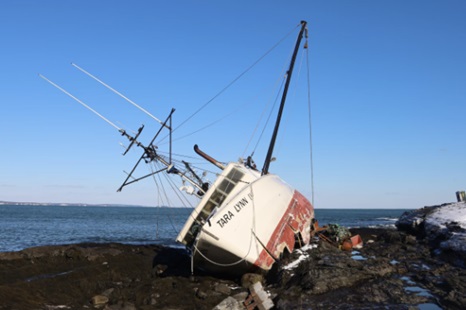
Crew member fell asleep while piloting fishing boat wrecked in Cape Elizabeth in Saturday’s storm
The owner of a fishing trawler that ran aground off Cape Elizabeth early Saturday morning says one of the crew members fell asleep after turning on the ship’s autopilot. “[The crew member piloting the ship] fell asleep at the wheel and then just went straight into the beach,” said David Osier, owner of the Tara Lynn II and Osier’s Seafood in South Bristol. “Operator error is the cause of this accident.” The Tara Lynn II is one of four ships in Osier’s commercial fishing fleet. On Saturday, the ship was en route to Portland Harbor after a day of trawling for groundfish. He said what happened next was recounted to him by the ship’s captain. more, >>click to read<< 07:16
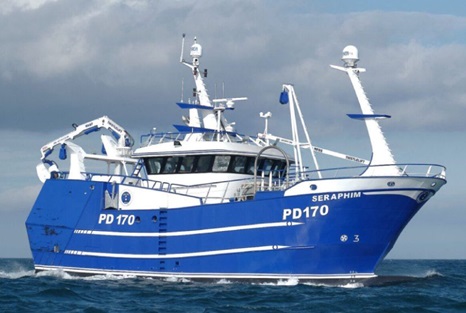
Vessel Review: Seraphin- Scottish Owner adds Prawn and Groundfish Twin-Rigger to fleet
Family-owned Lighthouse Fishing Company of Peterhead, Scotland has expanded its east coast vessel fleet with the recent acquisition of a new twin-rig trawler built by Parkol Marine Engineering. Seraphim was built to a design by Ian Paton of SC McAllister and Company for both single and twin rig trawling of prawns and groundfish. It can also operate as half of a pair trawler team if needed, providing greater flexibility for the owners. The development of the new trawler was in fulfillment of the requirements of Lighthouse’s owners, father and son fishers Andrew and Joshua Buchan. photos, info, >>click to read<< 10:43
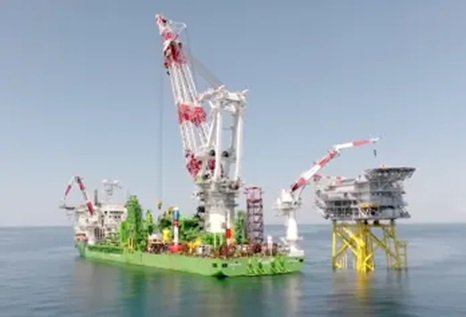
Contorting The Approval Process’: Biden Waived Taxpayer Safeguards To Get Wind Farm Built
A Massachusetts wind project, which recently became the first utility-scale offshore wind project to deliver electricity to the grid, wouldn’t have been financially viable if the Biden administration hadn’t intervened, according to internal documents reviewed by Fox News Digital. Federal officials with the Bureau of Ocean Energy Management (BOEM) acknowledged in the unearthed communications shared with Fox News Digital that granting a waiver on development fees designed to safeguard taxpayers was “critical” for the 800-megawatt Vineyard Wind project. [emphasis, links added] BOEM ultimately waived the financial assurance for the decommissioning costs fee for the project in June 2021. “The more we dig into the details of the Vineyard Wind project the more concerning it becomes. more, >>click to read<< 11:48
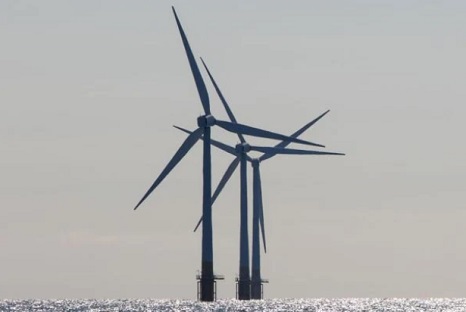
Commercial Fishers Say Biden Admin’s ‘Ocean Justice’ Initiative Totally Ignores Their Concerns
The Biden Administration announced the “ocean justice” strategy in December 2023 during the United Nations (UN) climate summit, known as COP28, in order “to advance environmental justice for communities that rely on the ocean and Great Lakes for economic, cultural, spiritual, recreational and food security purposes.” However, several stakeholders in the commercial fishing industry who depend on the fruits of America’s waters to make a living and are therefore interested in sustainable use of the oceans, say that the administration is overlooking their concerns about how the oceans are managed, especially with regard to the administration’s extensive efforts to fast track industrial scale offshore wind. more, >>click to read<< 10:19
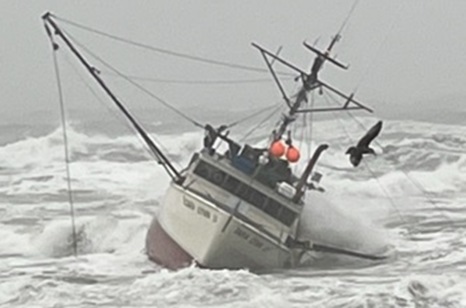
Fishing vessel aground off coast of Cape Elizabeth
A fishing vessel ran aground early Saturday morning, just as a powerful storm system was arriving in Maine. A mayday call was issued shortly after midnight, the U.S. Coast Guard confirmed with NEWS CENTER Maine, and the Cape Elizabeth Fire-Rescue was able to get to the scene by about 1:20 a.m. There was no information as of 11 a.m. whether any injuries were reported, and it was not clear yet why the crew was out in the storm at midnight. All four people onboard the Tera Lynn II, a 50-foot boat, were rescued by a skiff via a Water Extrication Team with the Cape Elizabeth Fire Department. more, >>click to read<< 12:52
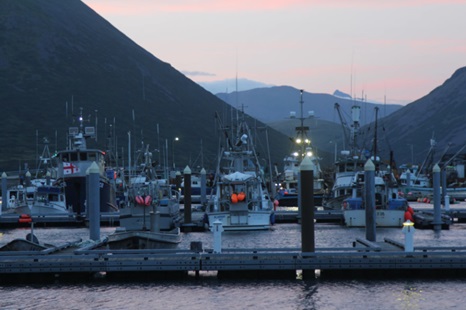
Peter Pan’s King Cove plant will stay closed this winter as fishing industry turmoil spreads
In a major hit to Southwest Alaska’s fishing industry, Peter Pan Seafood Co. will keep its huge plant in the village of King Cove shuttered this winter, meaning that the company won’t be processing millions of dollars’ worth of cod, whitefish and crab. “It’s one of the most difficult days of my life,” Rodger May, one of the company’s owners and a longtime player in the seafood industry, said in a brief interview Thursday. “It’s just a devastating time for the industry.” The closure is the latest sign of the widening turmoil in Alaska seafood markets, which are contending with depressed global demand across many different species and intense competition from producers in Russia. more, >>click to read<< 13:39
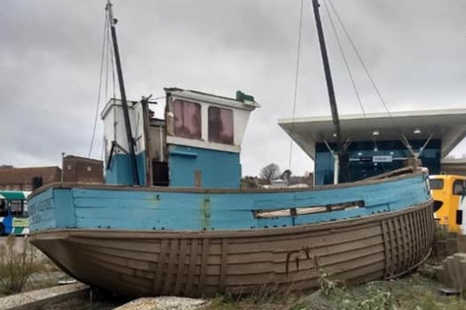
Campaign to save historic Hastings fishing boat from being demolished
The clinker built boat Dorothy Melinda has been on display on an island outside Hastings railway station for the past 15 years. It is the first thing visitors to Hastings see when they arrive in the town by rail. But now the Council has said its is planning or removing the boat later this month as vandalism and its deteriorating condition have caused it to become a safety hazard. A campaign has been launched to save the boat, which is part of the town’s fishing history, and restore it to its former glory. more, >>click to read<< 07:02

UPDATED! Louisiana shrimper missing for 6 days survived severe weather, found alive
The United States Coast Guard says a shrimper who disappeared while trying to salvage his vessel has been found alive nearly a week later. Timothy “Blimp” Cheramie was last seen on the afternoon of Thursday, Jan. 4 near Venice, Louisiana. The Coast Guard says Cheramie was reportedly trying to salvage his shrimp boat, which ran aground. Southeast Louisiana was battered by two rounds of severe weather on Monday, Jan. 8, including sustained winds of 15-25 mph gusting up to 45-60 mph, and several inches of rain over 12 hours. Photos, Video, more, >>click to read<< 14:46
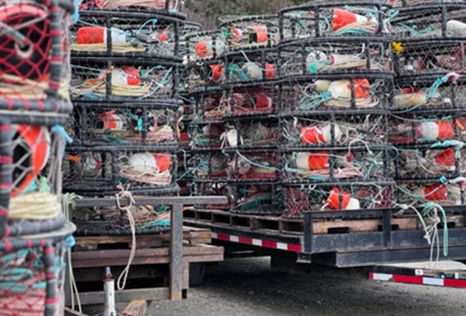
Crab Fishermen on Strike
Commercial Dungeness crab season is allowed locally as of midnight on January 5th. However, we are seeing no crab gear in the water. Local Dungeness crab fishermen are holding out for better pay after they say they’ve been offered an unacceptable amount per pound. The buyers are not offering a price that we’re okay with,” says Jake McMaster, Captain of the Fishing Vessel Captain Banjo. “They offered $3. We countered with $3.50 on the 1st of January, and we have not had a response to that price negotiation.” McMasters says they were getting this price over a decade ago, “$3 a pound– 2012, 2013, ten years ago. Meanwhile, Dungeness crab fishermen in Oregon are getting more than $3 a pound for their crabs. more, >>click to read<< 06:46
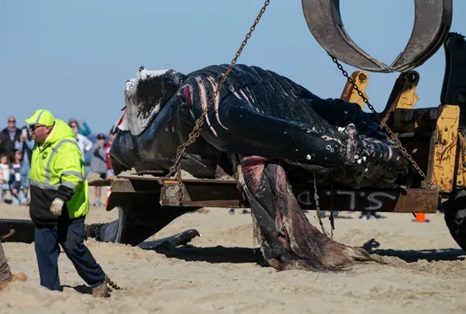
Whales and other marine life are still dying. The crisis at the NJ Shore remains urgent
It’s worth noting that it has been a full year since coastal residents realized that there was something amiss in our oceans — the start of a frightening number of whale and dolphin deaths. In the New Jersey and New York area alone, there have been 38 whales and 60 dolphins and porpoises washed ashore. That’s 98 endangered marine mammals found dead. That’s almost two marine mammals per week, while others have sunk to the bottom of the ocean. Meanwhile, the federal agencies responsible to protect marine mammals have neglected their responsibility, and turned down opportunities to cooperate, be transparent and engage in meaningful dialogue. Video, more, >>click to read<< 11:48
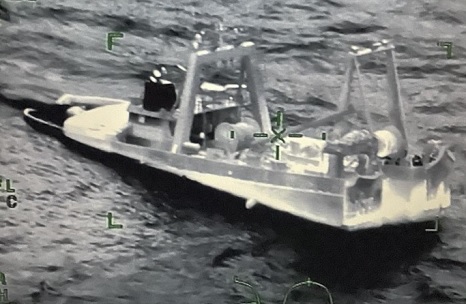
NTSB: F/V Tremont Hit MSC Boxship as it was Fixing Gyrocompass While Underway
The 115-foot trawler had a crew of 12 plus the captain and mate’s 2-year-old child aboard as a passenger when it left New Bedford, Massachusetts on October 7, 2022, for squid fishing off the U.S. East Coast. The crew told the NTSB about four or five days into the 20-day trip “the vessel’s gyrocompass became ‘kind of sporadic,’” but since the error was last than 10 degrees the captain and mate, “determined it ‘was something we could live with,’” and so they continued to operate along the East Coast. They also knew that the vessel’s AIS was not fully functioning and while it was transmitting it was not displaying on the trawler. more, >>click to read<< 07:41
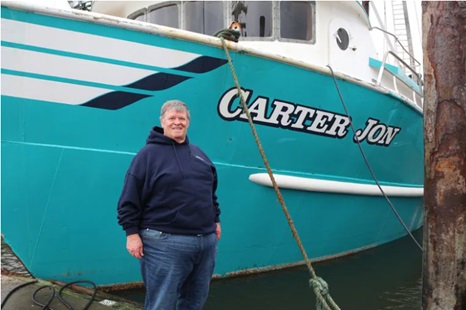
Lacking information, Oregon residents guess at future of offshore wind
The sun was peeking through the clouds during a short break in the rain as Nick Edwards was making his way along the Charleston Marina. Edwards fished along the Oregon Coast for more than 40 years and now owns an 80-foot trawler named the Carter Jon, which commercially fishes Dungeness crab and pink cocktail shrimp. Near the ramp’s entrance, Edwards ran into his captain, Jordan Murphy. The men exchanged keys, and the conversation quickly turned to floating offshore wind. “We don’t want that, that’s my perspective,” Murphy said. “It would be a lot of our [fishing] grounds.” “We don’t want the demise of our ecosystem to be the unintended consequences of offshore wind,” he said. photos. charts, more, >>click to read<< 08:53
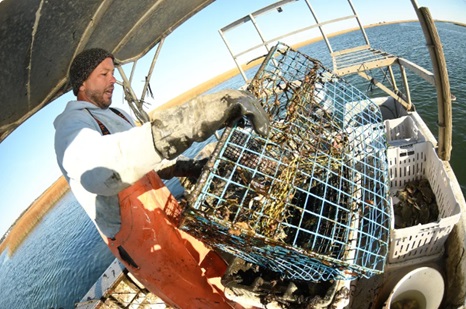
Hook, line and sinking: What’s the future of NC’s commercial fishing industry?
With a well-trained hook of the line by one of the founders and co-owners of Wilmington’s Seaview Crab Company, a few loops around the puller and a flick of a switch, the crab pot soon emerged. Inside the pot, a dozen or so blue crabs scampered around, some using their impressive claws to attach themselves to the mesh-sides of the cage. “It’s not always easy, but this never gets old,” Romano, 44, said as he emptied the crabs into a holding bin before checking to make sure they were all of legal size, the lucky ones getting tossed back into the waterway. The others were divided by size into containers to be sold individually − “These are the ones everyone wants,” Romano joked as he held up a good-sized crab − or to be sent to a crab house to be picked apart for their meat. photos, more, >>click to read<< 07:12
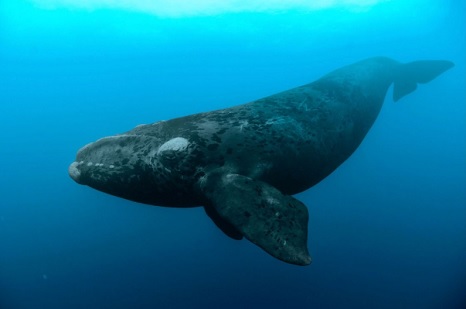
Are right whales big business for nonprofits?
Forget the green economy, the deep blue economy has it beat by a nautical mile. Ever wonder how much money is spent trying to protect the North Atlantic right whale? Ask any of the non-profit corporations that participate in funding to save them. Here in Maine, at least nine non-profit organizations support right whale conservation efforts, in addition to state agencies and the University of Maine. Nationally, the North Atlantic Right Whale Consortium shows 47 environmental organizations it identifies as “partners” on its website. Another 37 environmental groups signed a PEW charitable trust letter to Congress last March, critical of what it believed to be too little funding to protect the species. more, >>click to read<< by Jane Carpenter 08:36
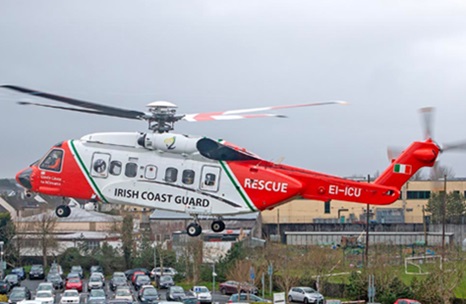
2,788 incidents coordinated by Coast Guard in 2023
In 2023, the Irish Coast Guard coordinated responses to 2,788 incidents which is the second highest number in 5 years (2,976 in 2021). August was the busiest month with a total of 391 incidents. The incident count covers the range of services provided by the Coast Guard. Services include search and rescue, maritime casualty support and pollution preparedness and response. IRCG also provides air ambulance services to the HSE including day and night aeromedical services to the offshore islands, assists An Garda Síochána with missing person searches, including inland and mountain rescue, as well as provision of other support to the Emergency Services. photos, more, >>click to read<< 09:56
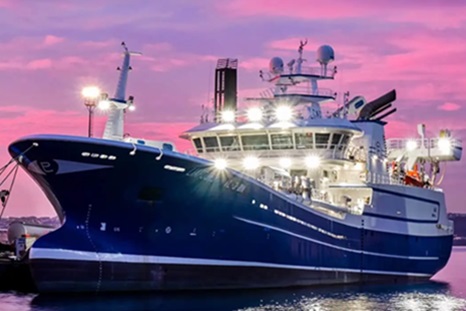
Liafjord Heads For Home
Norwegian fishing company Liegruppen’s new pelagic trawler Liafjord is steaming home to Norway, having been handed over to its owners by the Cemre Shipyard in Turkey. The 71-metre by 15-metre beam Liafjord is designed by Salt Ship Design and follows the groundbreaking LNG-powered Libas, which was delivered by the same yard several years ago. Liegruppen opted not to go for the same LNG propulsion system for Liafjord, although the vessel has some respectable green energy credentials, with electric winches, heat recovery technology and a large battery pack as part of its hybrid propulsion. Photo, more, >>click to read<< 12:21
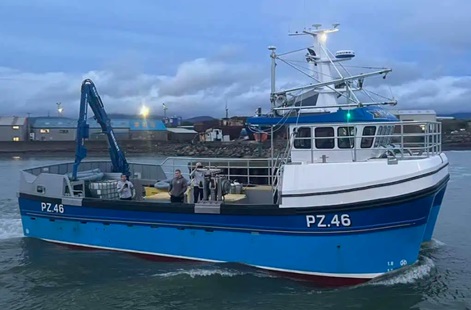
New Ring Netter Joins Newlyn Fleet
Built by G Smyth Boats in Kilkeel, new ring netter Inter-Nos PZ-46 made its delivery trip home to Newlyn to dock in its home port before Christmas. The Maxus Fast Cat has been designed and outfitted to fish for pilchards and is powered by a pair of Volvo Penta D8A5-A-MH main engines. The deck is laid out with a Spencer Carter 3000lb slave hauler with a MV500 motor and a Thistle Lift crane with a telescopic extension. more, >>click to read<< 08:31
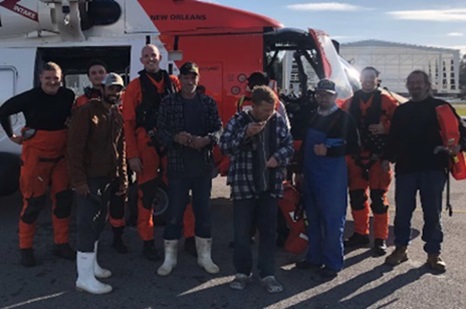
Coast Guard rescues six people from two disabled fishing vessels 70 miles east of Venice, La.
The Coast Guard rescued six people from two disabled fishing vessels Saturday approximately 70 miles east of Venice, Louisiana. Coast Guard Sector Mobile watchstanders received a report from a good Samaritan Friday at approximately 6:30 p.m. of fishing vessel F/V Georgia P being disabled approximately 70 miles east of Venice, Louisiana. Fishing vessel Seahorse responded to the tow of fishing vessel Georgia P. During the tow, the Seahorse also became disabled. Due to the captain aboard the Seahorse not having enough medication to get through the night, degrading weather, and poor communications, all crew members aboard agreed to be removed from their vessels. more, >>click to read<< 20:34
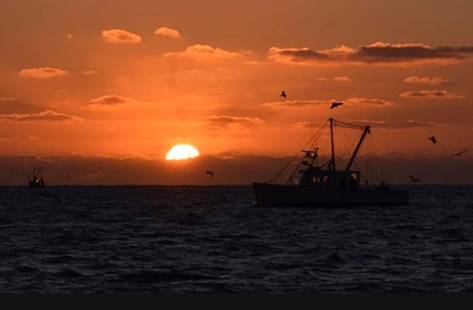
Scallop season is underway
In pitch-black morning, the scallop draggers start heading out Penobscot Bay to be ready one-half hour before the sun rises in Augusta to drop their drags overboard and begin a day’s work. Daylight here already broke the horizon as the scallop fishery opens for the day in the Gulf of Maine. “When the season opens, it’s like the first day of school,” said David Tarr, a scalloper off Naskeag Point and a member of the state’s scallop advisory council. Now two weeks into the season, and Tarr says, “I think it’s been a good opening. Boats are keeping local. Whether dragging or diving, the daily limit is 15 gallons of meat that sells anywhere from $12 to $23 per pound, depending on its size. 8 photos, more, >>click to read<< 07:55
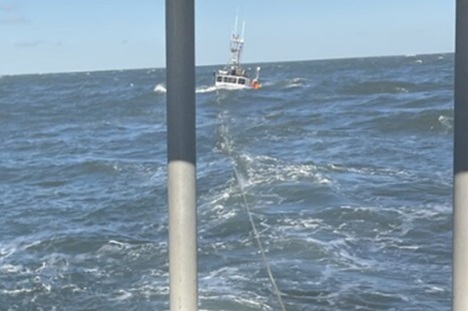
“Heroic” Rescue Off Nantucket: Station Brant Point Tows Disabled Fishing Boat In Rough Seas
With the sea still raging from the coastal storm that hammered the East Coast this week, a crew from Coast Guard Station Brant Point on Tuesday rescued a disabled fishing vessel southwest of Nantucket amid 15 foot waves and dangerous shoals. The call came in around 9:30 a.m. The 65-foot fishing vessel F/V Two Dukes had lost all steering and was adrift in the waters southwest of Nantucket, near Tuckernuck Island, with four crew members and one dog on board. To make matters worse, the captain was injured after a window got blown out in the heavy seas, leaving him with lacerations on his face. A four-man crew from Station Brant Point suited up and set out to take part in the rescue aboard the 47-foot motor life boat. After the long transit to the waters southwest of the island, the crew located the disabled fishing vessel as a Coast Guard helicopter hoisted two people off the boat, leaving behind the captain and one other crewman. photos, more, >>click to read<<-13:40
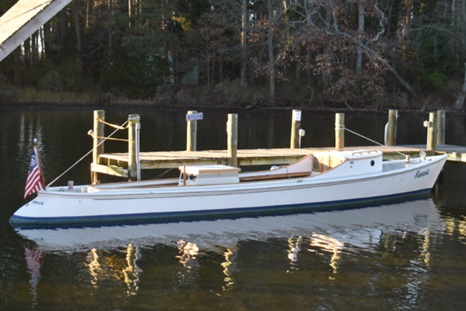
Christmas Comes Early: Reedville Fisherman’s Museum Gifted Historic Draketail
Reedville Fishermen’s Museum (RFM) has a special new resident at its dock. The museum was recently gifted a 99-year-old Chesapeake deadrise draketail boat with a unique dolphin nose stern by Bill and Beverly Pickens of Ware Neck, Va. Guests will have a chance to take tours on her beginning next year. Fannie is 36’ x 6’ x 2’6” and was built in 1924 by Charles Spencer. He built two boats of this style in his yard at Brick Inn on Main Street in St. Michaels, Md. One of the boats was named Fannie, after his daughter. The draketail stern, sometimes called a Hooper’s Island draketail because so many of this design was built in that area, was modeled after early motor-powered racing launches and torpedo boats. photos, more, >>click to read<< 06:20
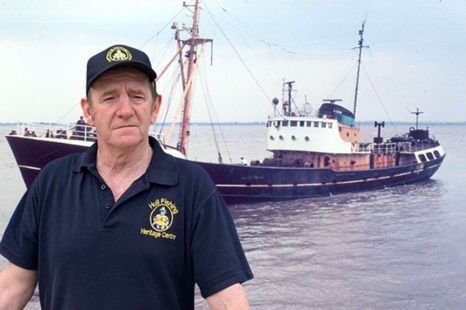
Hull survivor of Christmas Day trawler tragedy will light up sky to remember those lost, 50 years on
On December 25, 1973, the Ian Fleming was sailing towards the treacherous White Sea off the Russian coast. To avoid the worst of the weather, the skipper opted to head through the Norwegian fjords. It was here where the ship ran aground. Three men lost their lives that night: mate Terence Day, engineer Dennis Colby and George Lee. Aboard that ship was a 17-year-old deckie-learner, Jerry Thompson, who has dedicated his life to Hull’s fishing community. Jerry is the head of the Bullnose group, which operates the Hull Fishing Heritage Centre. Four years ago, the Hessle Roader and his family paid an emotional visit to the scene of the disaster. Photos, more, >>click to read<< 06:02
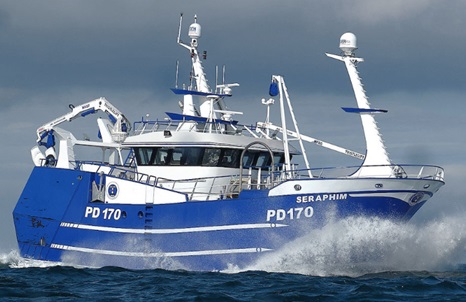
Compact Twin -Rig Trawler from Parkol
Built by Parkol Marine Engineering at its Teeside yard and completed alongside in Whitby, Seraphim PD-170 is the latest in a long line of Ian Paton designs for owners in Scotland. The 21.29 metre LOA, 7.70 metre breadth Seraphim packs a lot of functionality into a boat with a waterline length of 16.40 metres. This is a twin-rig trawler targeting both prawns and groundfish, laid out with the option of working as one half of a pair team if required. Built with a steel hull topped by an aluminium wheelhouse, masts and full-length shelterdeck, the new trawler was ordered by father and son Andrew and Joshua Buchan of Lighthouse Fishing Company, in partnership with P&J Johnstone. The boat was lifted into the water at the Teesside yard in late August before heading for Whitby. At the end of October Andrew and Joshua Buchan steamed home to Peterhead to collect trawl gear and carry out final sea trials before starting fishing in earnest. photos, more, >>click to read<< 12:12

Project Salmon Claus delivers Christmas to children along the Columbia River
For 11 years, Officer Jerrod Daniel has delivered gifts to children living at tribal fishing sites along the Columbia River. For some children there, Salmon Claus delivers the only Christmas gifts they receive. Members of the public can donate to the program until this Friday, While helping put a smile on people’s faces never gets old, one story in particular stands out for him. During a long day of delivering gifts along the river, Daniel met a young girl, about 8 years old. He handed her a wrapped present and unlike many of the children around her, she did not open it right away. When Daniel asked her why, she smiled and said “I’m going to save it so I have something to open on Christmas.” more, >>click to read<<09:47
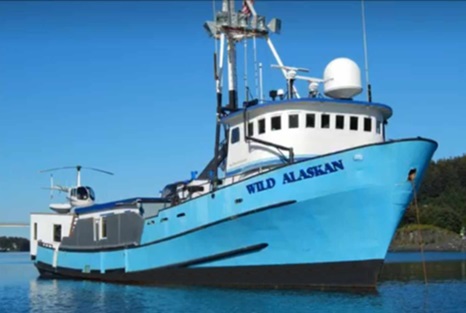
Sinking of the Wild Alaskan – Document Dump #46
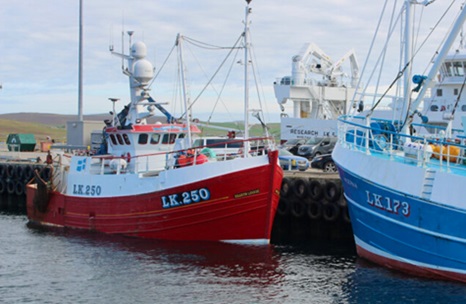
Fishing quota increases should be ‘welcomed by everyone’, industry says
There is positive news for the local fishing industry after a number of quota increases were confirmed for 2024. Commercially important fish stocks such as whiting (+124 per cent), haddock (+74 per cent), herring (+29 per cent), saithe (+25 per cent) and cod (+15 per cent) are all increasing. Shetland Fishermen’s Association (SFA) chair and Alison Kay skipper James Anderson said it was a statement of confidence in the condition of Scotland’s seas. “These 2024 quota increases are very much welcomed by Shetland’s family-owned fishing fleet, and should be welcomed by everyone – not just for the benefits that fishing brings to our islands, but for what it tells us about the state of our seas: the reality is that fish stocks are thriving,” he said. more, >>click to read<< 08:40







